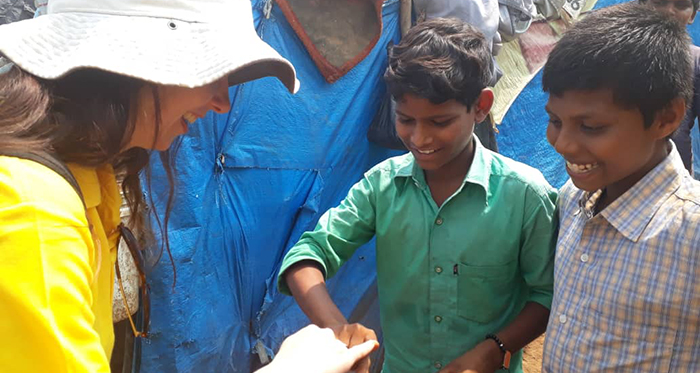Opportunities in Bengaluru
AECOM’s Australia and New Zealand partners with Pollinate Group to support employees wanting to take time to #GiveBack. This year, five employees participated on the 50th Professional Fellowship Program. As they return from their journeys, we’re following their stories through the #AECOMBlueprint blog series. This is a part of blog series that chronicles employees’ work through Pollinate Energy’s Professionals Fellowship Program over the last few weeks.
The business model of Pollinate Group is based on providing access to life-improving products such as solar lights, water purifiers and cooktop stoves to communities within India and Nepal with limited access to clean water, and little or no access to electricity. Local women are provided with the tools, skills and products to sell to families within their communities and the products can be paid for over several months to increase affordability. In addition to directly impacting the lives of local women and their communities within India and Nepal, Pollinate Group also engages with volunteers from across the globe, exposing them to the projects and initiatives of the organization. One of the aims of the volunteering program is to inspire participants to continue to work on tackling global issues, such as limited access to essential services, once they return to their day-to-day lives.
As one of the five participants in a two-week service trip in India, I am in Bengaluru working with Pollinate Group to collect data on the demographics and aspirations of the communities. This information will help Pollinate Group identify the potential to increase or modify their product range, with a view to improving the living conditions of people within the migrant communities of Bengaluru.
Our approach to data collection is to meet with residents living in the slum communities of Bengaluru and invite them to talk about their current needs, as well as their aspirations and the hurdles they face. Where possible, the conversations lead to an understanding of the individual, acknowledging their past as well as their present situation. The vast majority of people we talk to used to be farmers in their native land; however, lack of rain has led to crops failing and been the impetus for their migration off the land into the slum communities of Bengaluru. Now, most people work in construction and as housekeepers, their eyes set firmly on the future, with the shared goal of providing their children with a good education.

A day in the life of one of Bengaluru’s residents
Met Nagaraj, a farmer from Manthralaya, who has moved to one of the slum communities within Bengaluru. The rains have been arriving at the wrong time for the crops so he has come to the city along with his wife to work in construction. On the days when there is work available, they earn 400 and 300 rupees each. Nagaraj gets up at 3 a.m. to collect water and likes the climate of Bengaluru, which is cooler than his hometown. His community of approximately 100 homes shares three solar fans. There is no toilet and no electricity. A railway line marks the edge of their settlement, where he has lived for five years.
When the unpredictable rains do arrive, Nagaraj returns home for up to three months to help tend the land and harvest cotton. He takes with him solar lamps purchased from Pollinate Group and leaves them with his native village. His three children have remained there and are at school in Years 6, 7 and 12. During school holidays, they come to Bengaluru to visit.
Tinsel lines the rafters of Nagaraj’s home. His wife’s bangles hang from nails and utensils are arranged in order of height. Our translator relays my description of the challenges faced by farmers in Australia. He recognizes the story; he knows it by heart.






